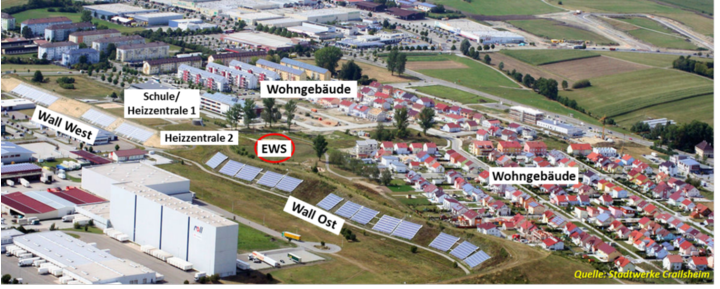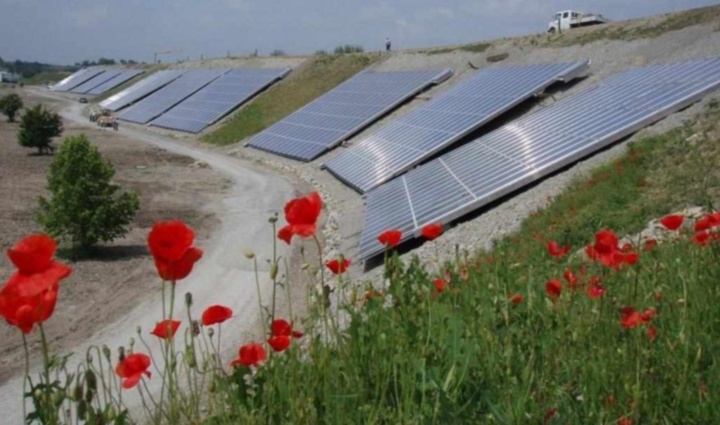Brief description
In Crailsheim/Germany, in the area of a former military base, the country’s currently largest system for solar district heat supply has been realized. The system has a seasonal thermal energy store and currently provides more than 300 housing units as well as a school and a gym with thermal energy. In 2004 and 2005, a first part of the system was built with approx. 1,500 sqm of collector area and operated without seasonal thermal energy storage yet. From 2007 to 2011, the system was extended by a second part with further collectors and a seasonal borehole thermal energy store in order to achieve a 50 % solar fraction in the supply of the first construction section of the “Hirtenwiesen II” network with a yearly thermal energy demand of 4,100 MWh.
Thus, the system currently consists of 7,410 sqm of collector area (aperture) corresponding to an installed thermal performance of approx. 5.2 MWth as well as a 39,000 m³ seasonal borehole thermal energy store, two buffer storages covering capacities of 100 m³ and 480 m³ respectively, and a compression heat pump with an electrical performance of 80 kW.
The final completion of the “Hirtenwiesen II“ network covers a second and third construction section. The heat demand target for the final completion, after the third construction section, is 7,266 MWh/a. Numerous buildings of the second and third construction section are already raised and connected to the “Hirtenwiesen II” network. In addition, further heat consumers are already supposed to be connected to the solar district heating system in the future residential area “Roter Buck” which is to be developed yet. The current solar fraction in district heat supply was at approx. 35 % at the beginning of the project.
The objective of the CROW project is the strategic and sustainable expansion and optimization of the solar district heating system “Hirtenwiesen II” in Crailsheim: considering the increased number of heat consumers connected to the district heating system, the originally planned solar fraction of at least 50 % shall be achieved again. Various options are available and will be analyzed and evaluated in detail. Afterwards, the measures identified as most interesting under economical and ecological aspects shall be realized. At the same time, the scientific-technical accompanying research in the fields of solar district heat and seasonal thermal energy storage shall be continued.
The project consists of two parallel phases:
- Phase 1 includes the scientific-technical accompanying research on solar district heating systems before, during and after the expansion measures. Several results from the scientific-technical accompanying research will be integrated into the planning of phase 2.
- Phase 2 implies an initial time frame of 1.5 years for the conception, simulation and planning of the expansion measures which need to be successfully completed in order to meet a milestone in March 2018. If the milestone was not met, phase 2 would be canceled. Upon the successful completion of the initial 1.5-year time frame, the basis for decisions regarding the second time frame is made. Time frame 2 follows directly to time frame 1 and includes the realization and launch of the expansion.
The joint project is coordinated by IGTE and is made up of the following two formal subprojects:
- Subproject of IGTE entitled “Accompanying research on solar district heat“,
- Subproject of Stadtwerke Crailsheim entitled “Expansion of the Hirtenwiesen II solar district heating system“.
Stadtwerke Crailsheim (STW) and IGTE pursue the common objective to successfully expand the solar district heating system in Crailsheim and to secure the system’s position as a role model.
Project duration
10/2016 - 12/2021
Project partner
Stadtwerke Crailsheim
Acknowledgements
The CROW project is funded by the Federal Ministry for Economic Affairs and Energy (BMWi), based on a decision of the German Bundestag, via Project Management Jülich (PtJ) under grant number 0325869A/B. The authors would like to sincerely thank for their support and take responsibility for this publication.
Contact

Dr.-Ing. Harald Drück
Research Coordinator and Team Lead



